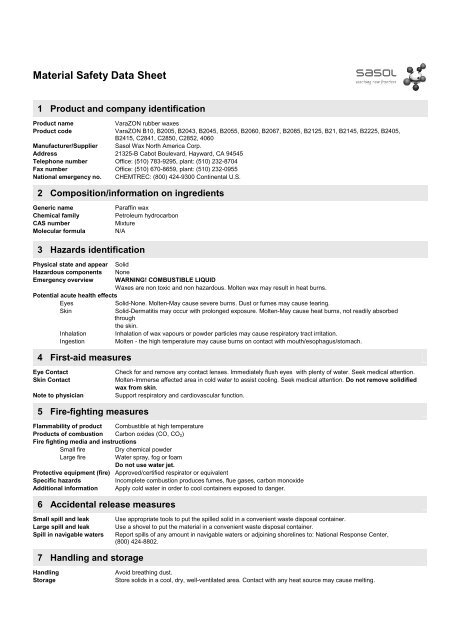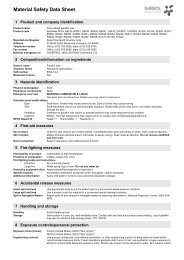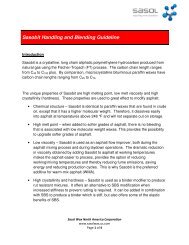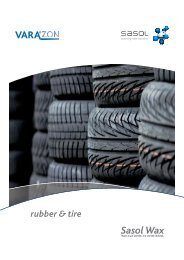VaraZON Rubber Wax MSDS rev July 2012.p - Sasolwax US
VaraZON Rubber Wax MSDS rev July 2012.p - Sasolwax US
VaraZON Rubber Wax MSDS rev July 2012.p - Sasolwax US
- No tags were found...
You also want an ePaper? Increase the reach of your titles
YUMPU automatically turns print PDFs into web optimized ePapers that Google loves.
Material Safety Data Sheet1 Product and company identificationProduct name<strong>VaraZON</strong> rubber waxesProduct code <strong>VaraZON</strong> B10, B2005, B2043, B2045, B2055, B2060, B2067, B2085, B2125, B21, B2145, B2225, B2405,B2415, C2841, C2850, C2852, 4060Manufacturer/Supplier Sasol <strong>Wax</strong> North America Corp.Address 21325-B Cabot Boulevard, Hayward, CA 94545Telephone number Office: (510) 783-9295, plant: (510) 232-8704Fax number Office: (510) 670-8659, plant: (510) 232-0955National emergency no. CHEMTREC: (800) 424-9300 Continental U.S.2 Composition/information on ingredientsGeneric nameChemical familyCAS numberMolecular formulaParaffin waxPetroleum hydrocarbonMixtureN/A3 Hazards identificationPhysical state and appear SolidHazardous components NoneEmergency overview WARNING! COMB<strong>US</strong>TIBLE LIQUID<strong>Wax</strong>es are non toxic and non hazardous. Molten wax may result in heat burns.Potential acute health effectsEyesSolid-None. Molten-May cause severe burns. Dust or fumes may cause tearing.SkinSolid-Dermatitis may occur with prolonged exposure. Molten-May cause heat burns, not readily absorbedthroughthe skin.Inhalation Inhalation of wax vapours or powder particles may cause respiratory tract irritation.Ingestion Molten - the high temperature may cause burns on contact with mouth/esophagus/stomach.4 First-aid measuresEye ContactSkin ContactNote to physicianCheck for and remove any contact lenses. Immediately flush eyes with plenty of water. Seek medical attention.Molten-Immerse affected area in cold water to assist cooling. Seek medical attention. Do not remove solidifiedwax from skin.Support respiratory and cardiovascular function.5 Fire-fighting measuresFlammability of product Combustible at high temperatureProducts of combustion Carbon oxides (CO, CO 2)Fire fighting media and instructionsSmall fire Dry chemical powderLarge fire Water spray, fog or foamDo not use water jet.Protective equipment (fire) Approved/certified respirator or equivalentSpecific hazardsIncomplete combustion produces fumes, flue gases, carbon monoxideAdditional information Apply cold water in order to cool containers exposed to danger.6 Accidental release measuresSmall spill and leakLarge spill and leakSpill in navigable watersUse appropriate tools to put the spilled solid in a convenient waste disposal container.Use a shovel to put the material in a convenient waste disposal container.Report spills of any amount in navigable waters or adjoining shorelines to: National Response Center,(800) 424-8802.7 Handling and storageHandlingStorageAvoid breathing dust.Store solids in a cool, dry, well-ventilated area. Contact with any heat source may cause melting.
8 Exposure controls/personal protectionExposure limits (fumes) ACGIH (United States, 2002) TWA: 2mg/m 3Engineering controlsNIOSH (United States, 2002) TWA: 2mg/m 3Use process enclosures, local exhaust ventilation, or other engineering controls to keep airborne levelsbelow recommended exposure limits. If user operations generate dust, fume or mist, use ventilation tokeep exposure to airborne contaminants below the exposure limits. Molten wax should not be exposed towater, as it causes violent steam explosions on molten wax.Personal Protective equipmentEyesSafety glasses or gogglesFace shields should be worn to protect eyes against hot wax splashes.BodyFull suitRespiratory Approved dust respirator, or vapour respirator in area of high concentrations of dust/vapourHandsHeat resistant gloves if working with molten waxFeetSafety bootsIn case of large spill Splash goggles, full suit, boots, gloves9 Physical and chemical propertiesColorOdorFlash point (closed cup)Congealing pointDensity at 25CAverage molecular massSolubility in water (20C)pH-value aqueous extractPhysical stateExplosion propertiesOff-white to white solid (molten wax is clear).None to slight petroleum odor.420ºF137-172ºF0.90 g/mlndnegligibleSolid at ambient temperatureHazard exists if in sub-micron form (dust)10 Stability and reactivityConditions to avoidIncompatibilityHazardous decomp. prod.Thermal decompositionProlonged storage 50C above congealing point may interfere with quality.Avoid contact with strong oxidizing agents.Flue gas, carbon monoxide, aldehydes in the case of incomplete combustionapprox. 250C11 Toxicological informationNOEL (rat) - 20 - 2000 mg/kg/dayOral TDL 0 rat - > 2000 mg/kg/day12 Ecological informationThe product is water-insoluble, and under normal environmental conditions, has no detrimental effect on plants, animals or micro-organisms.Keep away from waterways, sewers, drains, basements and confined spaces.13 Disposal considerationsWaste informationWaste must be disposed of in accordance with federal, state and local environment control regulations.14 Transport informationTHIS PRODUCT IS NOT CONTROLLED UNDER ANY OF THE FOLLOWING CLASSIFICATIONS:DOT (United States), TDG (Canada), IMDG, IATA15 Regulatory informationHCS classification CombustibleTSCA 8(b) inventory Paraffin waxCanadian DSL/NDSL Paraffin waxSARA ListNot foundThis product is not classified according to the EU regulations.Revision date: <strong>July</strong> 3, 2012
16 Other informationAlthough the information contained herein is presented in good faith and to the best of Sasol <strong>Wax</strong>’s knowledge and experience, it is madewithout any warranty or guarantee whatsoever.
















